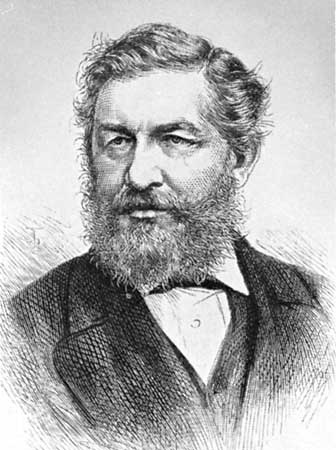Ward, William George
British theologian
born March 21, 1812, London, Eng.
died July 6, 1882, London
 English author and theologian, one of the leaders of the Oxford movement, which sought to revive in Anglicanism the High Church ideals of the later 17th-century church. He eventually became a convert to Roman Catholicism.
English author and theologian, one of the leaders of the Oxford movement, which sought to revive in Anglicanism the High Church ideals of the later 17th-century church. He eventually became a convert to Roman Catholicism.Ward was educated at Christ Church, Oxford, and became a fellow of Balliol College, Oxford, in 1834. He was ordained in the Anglican church in 1840. Under the influence of John Henry Newman (Newman, John Henry), later cardinal, he joined the Oxford movement, in which his role was that of an extremist pressing for submission to the Roman Catholic authority. Protestants strongly opposed his argument that the Thirty-nine Articles—the doctrinal formularies of the Church of England—were incompatible with the Catholic status of the Church of England. He was suspended from Balliol for supporting Newman in a series of pamphlets. After publishing The Ideal of a Christian Church (1844), which urged the Church of England to “sue humbly” at Rome's feet “for pardon and restoration,” his work was condemned by the University of Oxford.
In September 1845 he joined the Roman Catholic church, followed in the next month by Newman and many other members of the movement. Ward then taught theology at St. Edmund's College, Ware, Hertfordshire (1851–58), and received a doctorate of philosophy in 1854 from Pope Pius IX. From 1863 to 1878 he edited the Dublin Review, an influential Roman Catholic quarterly. With the poet laureate Alfred, Lord Tennyson, and Archbishop Manning of Westminster, Ward founded the Metaphysical Society in 1869. He eventually retired to the Isle of Wight.
Additional Reading
Philip Ward, William George Ward and the Catholic Revival (1893, reprinted 1978).
- Max Bruch
- Max Dehn
- Max Delbrück
- Max Devrient
- Max Dupain
- Max Eastman
- Max Elskamp
- Maxentius
- Maxentius, Basilica of
- Max Ernst
- Max Euwe
- Max Eyth
- Max Factor
- Max Faget
- Max Ferdinand Perutz
- Maxfield Parrish
- Max Frisch
- Max Gluckman
- Max Hoffmann
- Max Horkheimer
- Max Hussarek, Baron Hussarek von Heinlein
- Max Hussarek Hussarek von Heinlein, Baron
- Ma-Xia school
- Maxie Anderson
- Maxillaria